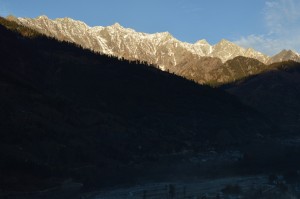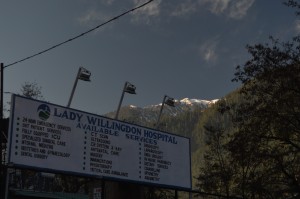At the moment I’m halfway through a four-week placement at Lady Willingdon Hospital, a mission hospital in Manali, northern India. As a location Manali reminds me a lot of Queenstown- they are of a similar size, are heavily oriented to tourism and both have fairly spectacular mountains jutting up all around them. I’ve arrived in the off-season, between the heavy tourist flows of summer and the milder peaks of winter.
Manali is served by two hospitals, a government-run hospital and Lady Willingdon Hospital (LWH- see www.manalihospital.com). Among the locals that I’ve spoken to LWH is held in high regard and many of them feel that the standard of care at the government hospital is dubious. While I can’t complain, having had my hand expertly stitched up at a government-funded clinic, I’ve heard some interesting stories come out of the government hospital. My favourite involves a heavily pregnant woman who went to get an ultrasound. The purpose of the ultrasound was to determine the size of the baby and the volume of the waters, but the ultrasonographer’s report simply concluded that the woman “is pregnant.”
LWH essentially operates as a 55-bedded private hospital- although fees are waived in those that cannot afford it- complete with ICU, emergency department, maternity wing and two operating theatres. Although it exceeds capacity in the summers, at the moment there are around 20 patients and it will likely stay that way throughout winter. Despite the reduced number of patients I still get to see a fair amount (coming in the off-season means that I am the only medical student at the hospital).
At the moment LWH is running on a skeleton crew of 6 doctors: a consultant physician, paediatrician, surgeon, obstetrician and gynaecologist, a surgical registrar and a house-surgeon. The days usually start with a morning ward-round. All the doctors join to form a “super-team” and together see each patient in the hospital. This results in some pretty amazing generalists- I don’t think I’ve ever seen a gynaecologist so well brushed up on internal medicine, nor a surgeon so proficient at paediatrics.There is also a wide range of diseases that the doctors have to be familiar with managing. So far we have admitted patients with stroke, meningitis, tetanus, ectopic pregnancy, heart attack, massive trauma and some bizarre neurological disorder that nobody can make heads or tails of. Just recently we had a particularly heart-rending 2-week old patient in ICU. He was admitted a few days ago with septicaemia and seemed to be getting better until yesterday, when he was found to have low blood pH, low sodium and blood sugars well over five times normal. Unfortunately his condition deteriorated overnight and he passed away early this morning. The morning ward round was a lot more difficult today.
Usually after the ward round has been dealt with the senior doctors do outpatient clinics while the junior doctors staff the emergency department. In outpatient clinics I am limited by not being able to speak Hindi, but the doctors explain to me the patients’ reasons for presenting. Common things that I’ve seen so far in outpatients include tuberculosis, type 2 diabetes and gallstones. I initially found the prevalence of diabetes to be quite surprising given how slim the population is… things started to dawn on me after repetitive cups of sugar-fortified tea supplied by the nursing staff.
Although permanently available for acute cases, surgical operations are scheduled for Tuesdays and Thursdays. At first I was alarmed by the lack of an anaesthetist, but between the surgeon and the anaesthetic technicians things run smoothly. So far I’ve been able to scrub in on a couple of operations and I’ve had several (unsuccessful) attempts at administering spinal anaesthesia.Overall the first two weeks at LWH has been pretty amazing. I’ve always felt that rural doctors have to be more comfortable with a broad range of diseases and so far this has been proven correct- as evidenced by the surgeon-cum-paediatrician-cum-anaesthetist. Working with doctors with such broad scopes has been ideal for someone like me, hoping to work in a rural environment after I graduate. With any luck the next two weeks will bring more of the same.


